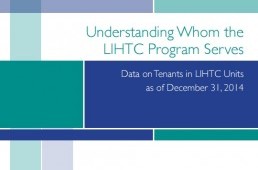
June 9, 2017 | by Michael Wilt
Categories: Affordable Housing, Rental Housing
A frequent question housing professionals get is, "who exactly lives in affordable housing." A recent U.S. Department of Housing and Urban Development (HUD) report helps answer this question with tenant-related data collected in 2014.
More specifically, the report provides demographic and economic data about tenants who live in affordable housing developments financed through the Low-Income Housing Tax Credit (LIHTC) program. The LIHTC program, explained in this earlier On The House entry, is the most utilized mechanism for financing affordable housing developments.
HUD is required to collect tenant-related data from states as part of the Housing and Economic Recovery Act (HERA) of 2008. This is the third time HUD has published data, and each time the Department is able to provide a more complete profile of tenants. This latest report includes data collected in 2014 from 70% of LIHTC program developments, offering a detailed snapshot of tenants who reside in those developments.
The report includes data on the race, ethnicity, family composition, age, income, use of rental assistance, disability status, and monthly rent burden of tenants who live in LIHTC-financed affordable housing developments. Here's a closer look at several of those data points:
Income Level
Housing Cost-Burdened
Use of Rental Assistance
For a summary of other economic and demographic data, the National Low Income Housing Coalition offers a brief overview of the report.
But the HUD report has limitations. As explained above, the data is only for tenants who live in developments financed through the LIHTC program, and HUD was only able to collect data from 70% of those developments. That said, it offers valuable insight about tenants who live in these communities and whose needs are met by affordable housing developers.
On the House blog posts are meant to provide general information on various housing-related issues, research and programs. We are not liable for any errors or inaccuracies in the information provided by blog sources. Furthermore, this blog is not legal advice and should not be used as a substitute for legal advice from a licensed professional attorney.
6/27/2017 how do I qualify for affordable housing / Hud. I am over 70 years of age and I am desperately looking for affordable housing in Houston, humble,and spring Texas as soon as possible. please contact me with additional information on how to apply. I have never lived in public housing before. thank you so much . MS Jessie Jenkins.
TSAHC reviews all blog comments before they are posted to ensure a positive experience for our online community. Off-topic comments; hostile, derogatory or deliberately insulting comments; and comments specifically promoting goods and services will not be posted.
Approved comments will be published in their entirety. Personal information will not be removed unless it pertains to someone other than the person submitting the comment. For more information, please see our Comment Posting Guidelines.
To remove a previously submitted and published comment, please contact Anna Orendain at [email protected].
If you have a question regarding any of TSAHC's programs, please contact us.

Hi Jessie,
The Houston Housing Authority would be an excellent resource for locating affordable housing in Houston, Humble, and Spring. Their phone number is 713-260-0600 and their website is http://www.housingforhouston.com. You can also contact HUD to find out more about their rental programs. The phone number is 800-955-2232. They also have an online tool for searching affordable apartments. The web address is https://www.hud.gov/apps/section8/step2.cfm?state=TX,Texas.